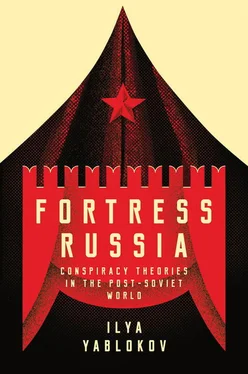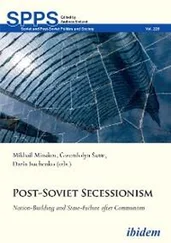Alliance with the West, and in particular with US foundations and intelligence, is used as a marker of the involvement of the opposition in the conspiracy against the Russian people. This is especially evident in the media representation of the leaders of the political opposition as a dangerous and conspiring minority. Television reports about the activities of the opposition, and about the anti-war marches, have sought to create the same negative image and compare Russian protesters with the activists who had overthrown Yanukovich’s regime. Kiselev’s report about the ‘March for Peace’ in September 2014 in Moscow opened with the reporter questioning the national loyalty of the protesters who came on the peace march. He then questioned why the protesters did not show support for the victims of the shelling of the cities in Donbass and did not protest against the murdered Russian journalists who died trying to tell the truth about the conflict. This served to detach the protesters from the supposed majority of Russians who supported the rebellious Donbass region. Kiselev’s introductory remarks served to create a split in the unity of the opposition forces as well as to query the sincerity of their intentions. The march was described as an alliance of random forces, from LGBT activists to radical Russian nationalists, who did not have any specific demands apart from opposing the Kremlin’s policies. One example of the way the protesters were cast as aliens can be seen in a quote from the march’s manifesto calling for the withdrawal of the Russian government’s counter sanctions against the EU, which had triggered high inflation in the country. Kiselev pointed out that the cancellation of the sanctions against Russia was not what the protesters wanted:
They are not asking for them to be revoked. The sanctions against Russia are good and right. They are more concerned about Russia’s response. They could have expressed it more briefly: return Italian sausages and French cheese to us. It’d be simpler and more honest. (Kiselev and Medvedev, 2014)
Many pro-state media reports on the opposition described it as a small and insignificant minority which was unable to gain the support of the Russian population. This rhetorical strategy was aimed at downplaying the importance of dissenting voices and deflecting attention from their arguments (Kiselev and Zarubin, 2016). At the same time the pro-Kremlin media strategy tried to explain why the opposition was so foreign to the Russian nation and why its opinions had to be countered by means of hostile political campaigns. Support for the Western sanctions and the new Ukrainian authorities turned the opposition into an internal ‘Other’ whose loyalty lay with the West. As Limonov put it: ‘Liberals… took the position of traitors, supporting the USA and the West in the war with Ukraine; this position is opposed to the opinion shared by the majority of Russian people’ (Limonov, 2016).
Vesti Nedeli ’s attempt to separate the ‘conspiring minority’ of Russian opposition leaders from both the majority of the Russian people and the ‘loyal’ opposition was carried out against the background of supposedly very low popular support for the opposition leaders. Indeed, during the Ukraine crisis the popularity of the opposition parties did significantly drop (Levada-tsentr, 2016b). Various pro-state speakers explained that the most prominent leaders of the Russian opposition were working with Western intelligence because the resources and power that the West could provide compensated for their lack of support from Russian voters. This is a clear example of how a conspiratorial populist discourse manifests itself in today’s Russia. Although an extremely low rating indicates the opposition leaders’ unpopularity among ordinary Russians, this does not prevent the authorities from seeking to ruin their reputation with conspiratorial allegations of close collaboration with US and EU intelligence.
One Vesti Nedeli report, broadcast on 26 April 2015, elaborated on Putin’s idea of what constituted a ‘healthy’ political opposition and why those who sought the support of the West were not part of it. The report discussed the trip made by Mikhail Kas’ianov, the leader of the opposition party RPR PARNAS, to the USA to hand over a list of suggestions for further economic sanctions. Kiselev’s opening statement made it seem as though Russia was the freest country in the world, where everyone had the freedom to speak out. According to Kiselev, a ‘normal’ opposition would seek support among the people and endeavour to convince them that its economic programme and leadership skills would enable it to run the country. Conversely, Russian opposition leaders did not choose to seek support from the Russian people, but instead travelled to Washington with a list of people on whom to impose sanctions (Kiselev, 2015b). This contrast between a ‘healthy’ and an ‘anti-national, subversive opposition’ exemplifies how the political opposition in Russia could be turned into a dangerous internal ‘Other’ and its reputation undermined by conspiratorial allegations.
Showing the opposition leaders’ support of Ukrainian independence, and their criticism of the Russian intervention, is another way of portraying them as the internal ‘Other’ which is related to the dangerous and conspiring external ‘Other’, the West. A Vesti Nedeli report from 8 March 2015, which detailed the US Congress hearings on Ukraine and Russia, included a quotation from Russian chess player and politician Garry Kasparov, who described the Russian authorities as ‘a cancerous growth’, and asked the American Congress to ‘place their bets’ on new people. Kasparov’s comment was followed by one by the journalist: ‘Those people in Kyiv, on whom Americans put bets, started out by capturing governmental buildings and [throwing] Molotov cocktails. Soon they switched to tanks. A year later, according to the UN, there are six thousand people on the list of victims’ (Kiselev and Bogdanov, 2015).
The Russian opposition’s alliance with the new Ukrainian authorities, as well as with the US administration, was, for Vesti Nedeli journalists, evidence that the opposition leaders were prepared to assist in the destruction of Russia and the plunder of its resources, in exchange for being appointed leaders of the new country, just as the Ukrainian opposition became the new leaders of Ukraine after February 2014 (Kiselev and Zarubin, 2016). The Vesti Nedeli reports became a powerful political instrument in shaping domestic public opinion about the Kremlin’s opponents. Particularly after 2012 they had a major influence on public opinion, improving the image of the Kremlin’s authoritarian policies and turning Putin into an unassailable and uncontested national leader.
The ‘People’s’ Leader and the ‘Treacherous Elites’
One of the Russian authorities’ objectives in relation to the Ukraine crisis was to increase Putin’s popularity among different factions in Russian society. Encouraging people to ‘rally around the flag’ made it possible for the Kremlin to increase public support for the authorities even among groups which used to be critical of their actions (Greene and Robertson, 2017). From the middle of the Ukraine crisis Putin’s popularity has been stable and heartfelt (Volkov, 2015; Frye et al., 2017).
The state-aligned media has found various ways of supporting the notion that there is overwhelming support for Putin, and that he is a man of ‘the people’. Firstly, it has quoted pollsters who have supposedy demonstrated overwhelming public backing for the president. Secondly, it has shown images of happy crowds gathered at events attended by Putin. For example, the Vesti Nedeli report about a concert on the Day of Russia in June 2015 stated that every centimetre of Red Square was filled with people celebrating Russia’s independence and glory. The total turnout was an unexpected forty thousand. The report depicted Crimea as an inseparable part of Russia, and resistance to attacks by the West – the sanctions imposed on Russia, for example, and the West’s criticism of the war in Ukraine – served as the basis for solidarity among Russians who pledged their support for Putin. The author of this report quoted Putin as saying: ‘Nobody has ever managed to decode Russia and shift its standards. They can’t excommunicate us, turn us away, isolate us from our roots and origins’ (Kiselev and Zarubin, 2015). These conspiratorial allusions also helped to boost societal cohesion and serve nation-building practices. In contrast to the divided Ukrainian nation, a ‘failed state’ (The New Times, 2014; Korovin, 2015) as pro-Kremlin speakers described it, the Russian people stood united behind its leader and were ready to protect the nation’s prosperity and security.
Читать дальше
Конец ознакомительного отрывка
Купить книгу












